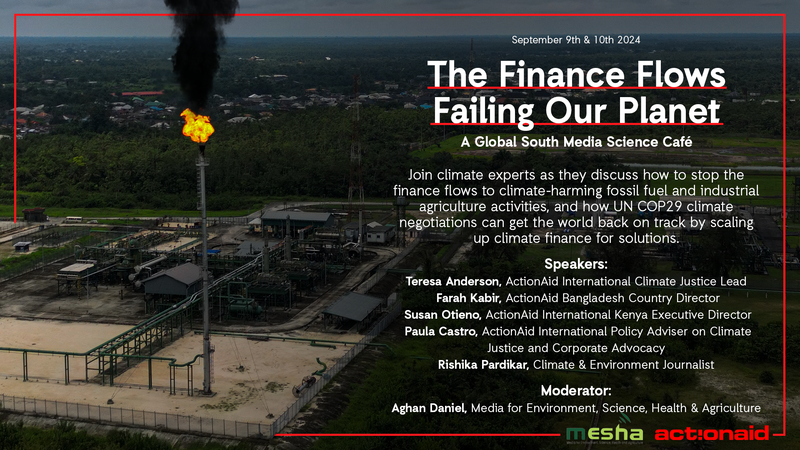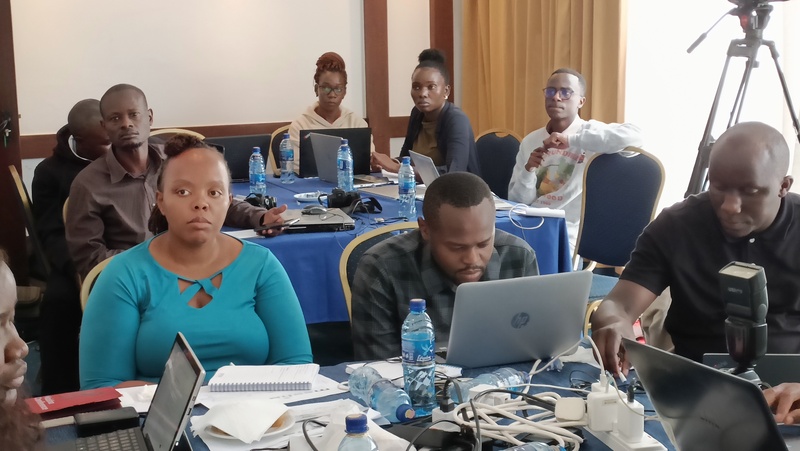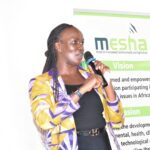By Aghan Daniel I aghan@meshascience.org
Last week, the special session of the African Ministerial Conference on the Environment ended with a clerical call for the continent to up its game if countries are to achieve their Nationally Determined Contributions to the climate kitty which is estimated at US$2.8 trillion between 2020 and 2030.
It is amidst this background that ActionAid and the Media for Environment, Science, Health and Agriculture (MESHA) have organised a two hour media science café to discuss the ever complicated issue of climate finance.
The webinar christened Global South Media Science Café – The Finance Flows Failing Our Planet goes on air on Monday, September 9, 2024 at 12 noon Kenyan time.
“This is a crucial year in the climate justice space as climate finance issues take centrestage, with finance being key to both the causes and the solutions to climate change,” reads a statement from ActionAid in their invite to journalists from Africa and Asia.
In his address to MESHA members recently at a training called to shed light on how to report research findings, MESHA’s Chairman, Bozo Jenje noted that the finance flows to climate-harming activities such as fossil fuels and harmful industrial agriculture must be stopped, and the urgently needed finance for climate solutions and coping with climate impacts be significantly scaled up.
Last year, ActionAid launched its flagship report looking at the role of banks in the climate crisis. As a follow-up to this report, this year ActionAid will launch a second report looking at the role of public finance in the climate crisis. The launch will take place on September 17, 2024.
Unfortunately, even though global South countries face the worst impacts of a crisis they have done very little to cause, they are also the least informed about how to cope with it. Due to the low exposure to climate issues in general, journalists from the Global South fail to communicate these effectively. The low exposure can be linked to poor capacity in terms of technical and financial support. Without this crucial information, communities in the Global South are not well informed on how to mitigate these impacts and their voices often go unheard.

According to the MESHA Secretariat, journalists who will attend the café on Monday, September 9, 2024 will benefit from a lot of content to help in telling stories on climate finance. The first presentation by Teresa Anderson, ActionAid International Climate Justice Lead will touch on how finance is linked to the climate crisis. She will also speak about the role of private finance in the climate crisis based on ActionAid’s report on the banks fuelling the climate crisis as well give speak on how COP29 help scale up climate finance for solutions
On her part, Farah Kabir, ActionAid Bangladesh Country Director will share how Bangladesh is coping with the impacts – The case for Loss & Damage funds.
Other topics lined up include ActionAid’s S(hell) documentary – Impacts of oil exploration in the Delta and key highlights from ActionAid’s upcoming report.
Susan Otieno, ActionAid International Kenya Executive Director, Paula Castro, ActionAid International Policy Adviser on Climate Justice and Corporate Advocacy and Rishika Pardikar, Climate & Environment journalist complete the list of speakers at the media science café.
The Media Science Cafés (present in Kenya, Tanzania, Uganda, Malawi, Zambia, and Zimbabwe) improve journalistic understanding and reporting on complex science and climate change issues, combat misinformation, and incorporate diverse perspectives into media stories.
In preparation for COP28 held in Dubai last year, MESHA successfully held three science media cafes to prepare journalists to effectively cover the event with funding from International Development Research Centre (IDRC) eastern and southern regional office based in Nairobi.









